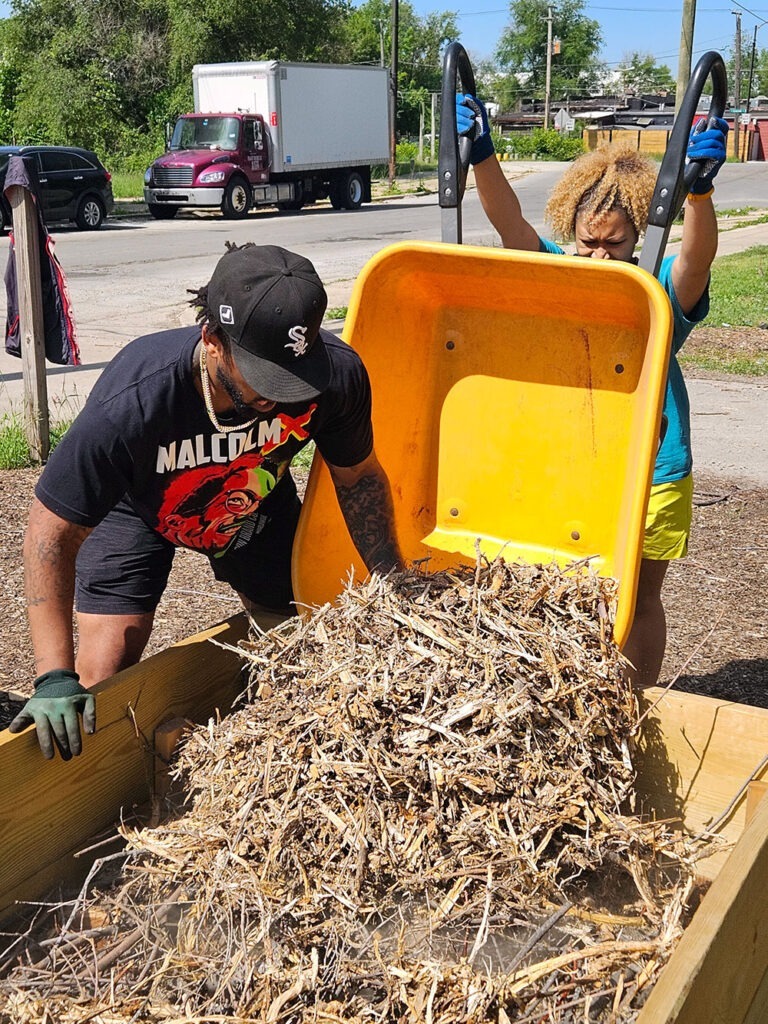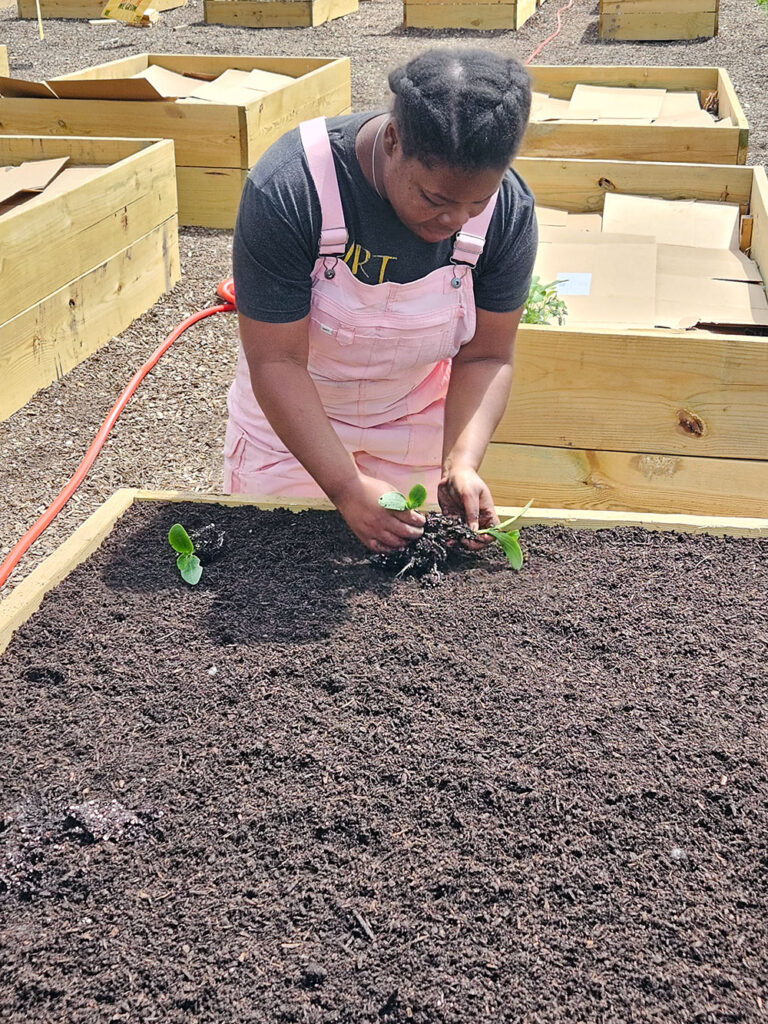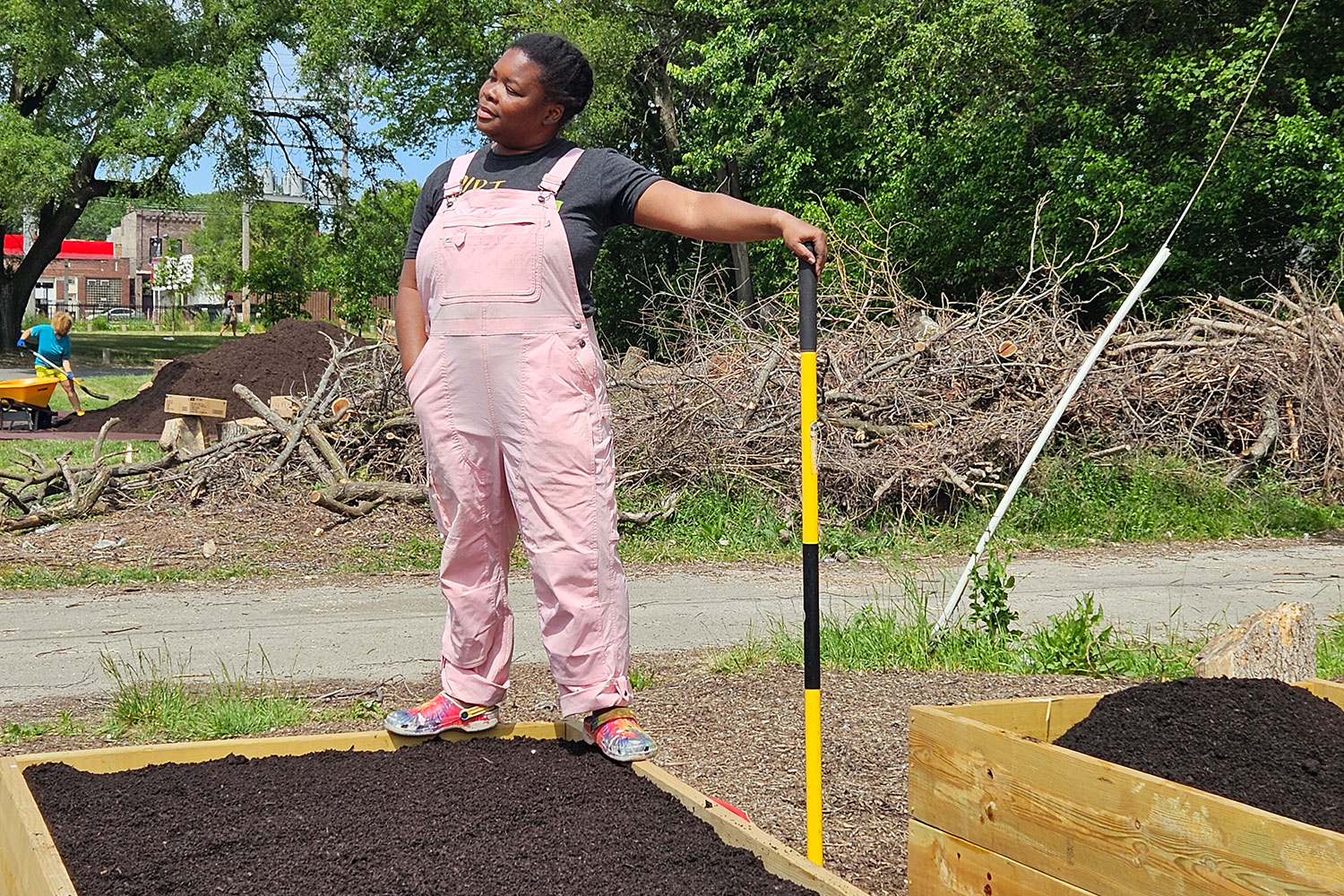It was planting day at We Sow We Grow, one of the smallest farms in the state of Illinois. We Sow We Grow occupies a single vacant lot at the corner of 120th Street and Union Avenue, in the West Pullman neighborhood on the Far South Side. A dry cleaner once did business there, but it went the way of most businesses near this corner, demolished years ago.
Natasha Nicholes, the founder and mistress of We Sow We Grow, was dressed for farm work in pink overalls. Nicholes examined a pile of compost, black as burley tobacco, and tried to calculate how many raised four-by-eight foot beds they’d have to fill to plant her Home Depot-bought sprigs of cabbage, brussels sprouts, oregano, thyme, and dill.
“What do you think, four of these?” she asked her husband, Shomari, who was holding a pitchfork.
“Five or six,” he estimated.
“I can’t believe this is happening!” Nicholes burbled. “I might cry! This feels a lot like it did when we first started. We literally dug everything up.”
Nicholes tore her rotator cuff while shoveling mulch last fall, so she left the heavy farming to Shomari and two volunteers. They heaved the compost into a wheelbarrow, dumped it in the beds, smoothed it with rakes. It was sweaty, medieval, pre-industrial farm work, all done by hand, without tractors, or even plows.
“Commercial farms, they’re using equipment,” Shomari said. “In a small bed, that won’t work. Everything has to go back to roots.”
If We Sow We Grow were the subject of a sitcom, it would be called Green Quarter of an Acre. Unlike gentleman farmer Oliver Wendell Douglas, Nicholes never dreamed of returning to the dirt when she was growing up in East Garfield Park. After graduating from Lincoln Park High School, she studied biology in college, then served six years in the Navy, at Naval Station Great Lakes. In 2010, when she learned she was pregnant with twins, she started a blog about domestic life, Houseful of Nicholes. In 2014, she and Shomari moved from East Garfield Park into a Habitat for Humanity house they’d helped build in West Pullman. Right across the street, they saw the vacant lot.

“I got started because this was an ugly plot of land,” Nicholes declared. “It was covered with grass. There were huge divots. It was a dry cleaners. They tore it out and left the basement. It was a concern.”
Nicholes decided to start a farm there. The only problem: she knew nothing about growing crops. As a child, she enjoyed eating okra and picking tomatoes from her grandmother’s kitchen garden, but her thumb was so brown that even attempts at backyard gardening failed: “I think I grew cherry tomatoes. Our broccoli grew up well, but I didn’t know when to harvest it, so it went to flower.”
But city girls can become farmers. Before We Sow We Grow planted its first crops in 2016, Nicholes researched small-scale farming in books such as The Lean Farm and Compact Farms. In 2019, Nicholes signed up for a six-month master urban farmer program through the University of Illinois Cooperative Extension Service, learning “soil remediation, water retention, everything you would need as a farmer.” The city owns the land, so We Sow We Grow partnered with then-Ald. Carrie Austin. Starting each July, when the tomatoes, cucumbers, peppers, watermelons, cantaloupe, honeydew, zucchini, pumpkins, squash, okra, cauliflower, eggplant, and sweet corn begin to ripen, We Sow We Grow sells produce to the neighbors.
On this farm in the city, the calls of mourning doves, cooing in trees across the street, were drowned out by ambulance sirens. During the planting, one of those neighbors wandered over from her own Habitat for Humanity house on Union Avenue, looking to help.

“This place was pretty much a forgotten spot,” said Ida Alkadi, a Muslim woman in a hijab. “Natasha deserves praise to God our creator, that he gave her the strength to do this. Emotionally and psychologically, it enhances your life, just seeing that little bit of growth. You see watermelon, it’s beautiful.”
Having mastered farming in a single lot, Nicholes has ambitions to expand. This year, We Sow We Grow added a chicken coop, housing 40 hens who each produce an egg a day, which the farm sells for $5 a dozen. (Most of the money to fund We Sow We Grow comes from grants, such as $150,000 from Chicago Beyond!, and from volunteering to sell concessions for Aramark at sporting events and concerts. They worked last weekend’s Taylor Swift shows. It’s such a small operation that the Nicholeses ran a hose from their house across the street to water the mulch.) Next, she wants to start farming in the vacant lots across the street, establishing West Pullman as an agri-neighborhood.
“We want to take over all four of the lots on this corner,” Nicholes said. “We want to build a food forest that adds to the beauty of the neighborhood. We have more than enough vacant lots in West Pullman.”



